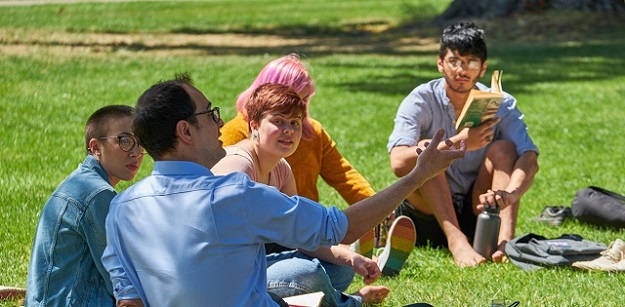Student Perspective: The International Honors Program at PLU
How the honors program changed my experience

Image: IHON class of Christian Gerzso on the lawn by Admn. at PLU, Monday, May 6, 2019. (Photo/John Froschauer)
I squinted at the sun, wondering whether the grass underneath me was too wet, while the rest of my class settled down in a circle around the professor. It was the first (and, as we learned, the last) time that we convinced our International Honors (IHON) professor to have a class outside.
The weather was delightful. The topic of conversation was: “Are kids the only ‘things’ in the world that have not changed for centuries because they are not yet exposed to all the progress we have made?”
We didn’t come to a solid conclusion, nor were we supposed to – IHON guidelines focus more on the process of critical thinking rather than its destination. The International Honors Program, where students from different majors are graded based on their ability to develop their thoughts and not on whether they are correct, makes a PLU education special.
If you are an IHON student at PLU, you will be taking around seven IHON classes at different levels instead of required general education classes. Additionally, you will be reading a lot. Most of your IHON curriculum will be made up of different texts from any possible time and place. The reason for that is provided on the PLU website: “We read these works because we think they offer perspectives that you can’t find anywhere else on enduring questions of human existence.”
Contrary to most teaching techniques, no one will tell you what to think or how to feel about these texts – you are left to draw your own conclusions which are to be discussed with the class. However, don’t confuse the freedom of thought with neglect. IHON professors have specific guidelines on how to approach texts from different eras and cultures. They want you to be able to attune yourself to the text and make a mental separation of what you were taught to believe versus what it is that you are working with.
It may seem that enrolling in IHON is a kind of contract you sign that limits the wide selection of classes you could experiment with during college. I would argue that enrolling in IHON is an insurance that you will graduate from PLU able to think on your own. This program is close to the hearts of many Lutes, if not for its critical thinking skills then for the small but lovely IHON community.
Written by: Kateryna Savienkova, Admission Communications Intern, for The Mast (2024, October 8).
Learn more about PLU’s honors program here!



Social Media